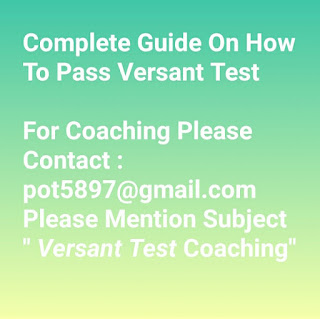 |
- Speak loud enough
- Avoid dead air
- Avoid stuttering
- Avoid fillers such as “uhms” and “ahh”
Versant has six parts (Part A to F).
Part A is reading.
You will be instructed to read sentences included in the piece of paper given to you at the start of the test. The voice will tell you to read sentence 1, 10, 2, and 5 for instance; but even if you don’t read the sentences you are asked to read, it doesn’t matter. What matters is you read something loud and there is no dead air.
Part B is repeat
You just have to repeat the sentences you heard the voice say. Even if you don’t understand what has been spoken, it doesn’t really matter. Still say something in a way that you don’t sound unsure of what you are saying. Even if you say, “I’m sorry I don’t understand what you said because it was too fast.” is fine for as long as you follow the correct intonation and you don’t sound doubtful of your answer.
Part C is providing simple answer to the question
For example, the voice says, “Andrew is thirsty, will he grab melon juice or an apple pie?” Even if your answer is “apple pie,” it doesn’t matter. Just make sure that you sound affirmative and you answer promptly. But of course it is better if you answer it truthfully and correctly.
Part D is arranging the jumbled sentence
For example, “Robert believes / the difficult exam/ that he will pass.” should be arranged to “Robert believes that he will pass the difficult exam.” Again here it doesn’t matter if you are able to arrange the jumbled sentence correctly. Even if you say “Robert believes the difficult exam that he will pass.” in a manner that it sounds like it is the sentence itself, it is absolutely fine. In fact, even if you say a totally different sentence, it is OK.
Part E and F require longer answers as they are timed
One of my friends told me that when he took the Versant at one of the biggest call centers in Mandaluyong, the recruiter instructed him to just “pray” Our Father Who Art in Heaven. The prayer itself won’t grant you a sure pass, but since it is a memorized text, you will not likely commit dead air, stuttering, and fillers. You can also recite it loud enough.
The problem, however, is if the recruiter intervenes in the Versant. Everything is recorded so your response can be listened to by the recruiter especially if there are only a few people applying for that job. The recruiter will have sufficient time to listen to your recording.
Think of your own creative way to be spontaneous. For instance, instead of saying “My family went on a picnic.” say, “My mother, father, brother, sister, and I went on a picnic.” Or instead of saying, “He works on weekdays” say, “He works on Monday, Tuesday, Wednesday, Thursday, and Friday.” I label that strategy “listing.”
There are plenty of strategies that you can use in a way that you don’t appear cheating. Moreover, you can always have a pen and paper handy to help you remember the information that you heard. Ask your recruiter if you can.

No comments:
Post a Comment